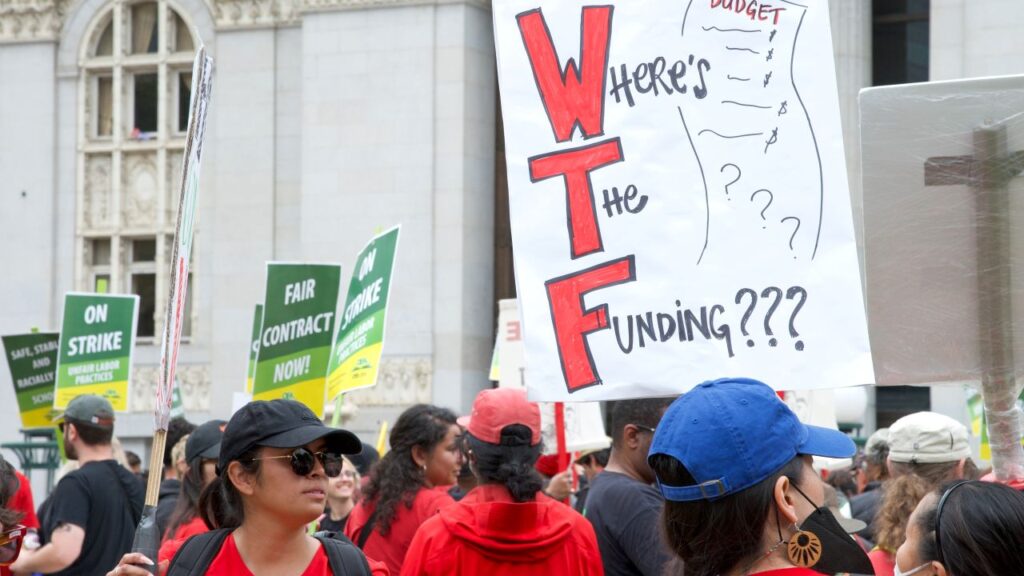California faces a complex balancing act between reducing emissions and managing gas prices as it transitions to cleaner fuels. (CalMatters/Larry Valenzuela)

- California's Air Resources Board proposes new fuel standards that could significantly increase gas prices in coming decades.
- Refineries in California are closing or considering closure due to increasing state regulations and profitability concerns.
- The state's transition to non-carbon power for transportation could lead to supply and price volatility if not managed properly.
Share
|
Getting your Trinity Audio player ready...
|
California motorists buy and consume a billion gallons of gasoline each month and are very sensitive about pump prices, which are markedly higher than those in other states. Naturally, they are a political football.

Dan Walters
CalMatters
Opinion
Gov. Gavin Newsom has repeatedly characterized refiners as price gougers, even though most of the differences are caused by taxes, fees and regulatory mandates. Recently, he persuaded the Legislature to pass a watered-down version of his proposal requiring refiners to maintain higher reserves to avoid price spikes.
Related Story: Will California Riders Embrace Electric Motorcycles? Proposed Rules Require It
Complex Factors Behind California’s Gas Prices
However the gasoline situation is far more complicated than Newsom’s approach, and California may be facing a period of volatility on both supply and price as it attempts to wean itself from combustion-powered transportation, its largest single source of greenhouse gas emissions.
The California Air Resources Board is on the verge of expanding its program of reducing the amount of carbon in the current gasoline recipe, regarded as an interim step before completely converting vehicles to electricity or some other non-polluting power.
Last year, CARB published an analysis of the proposed Low Carbon Fuel Standard to provide “the economic incentives to produce cleaner fuels like electricity, hydrogen and biofuels that are needed to displace fossil fuels and reduce transportation sector emissions.”
The report estimated that adoption could immediately increase gas prices by 47 cents a gallon and then, “on average, from 2031 through 2046 the proposed amendments are projected to potentially increase the price of gasoline by $1.15 per gallon, the price of diesel by $1.50 per gallon and fossil jet fuel by $1.21 per gallon.”
Related Story: New California Laws Boost Affordable Housing, Protect Tenants
CARB’s Shifting Stance on Price Impacts
The cost estimate generated a storm of media and political attention and CARB backed off, continuing the adoption process but refusing to put a number on the potential pump price. Last week, the board’s top official conducted an electronic press conference in which he stressed positive impacts, but continued to sidestep questions about consumer impacts.
“It’s a win-win,” executive officer Steven Cliff insisted. “We get public health benefits, we reduce health costs, we see lower costs of driving and we help turbocharge those investments in clean energy infrastructure that helps drive our zero emissions future.”
CARB now intends to act on the policy three days after Election Day, without offering any estimate of consumer costs — a potential signal that those costs will be hefty.
While Newsom wants to be remembered as someone who tried to reduce gasoline prices, his governorship probably will be one that substantially increased them.
Related Story: New First 5 California Initiative Encourages Dads to Get More Involved with ...
Uncertain Future for California’s Gasoline Supply
The other uncertainty is whether California will have enough gasoline, even a variety with less carbon, over the next two decades as it transitions away from carbon fuels altogether.
California once had dozens of refineries producing the state’s unique fuel blend, but in recent years just nine. After the Legislature gave Newsom the new laws on gasoline reserves, one refiner, Phillips 66, announced that it would shutter its plant in Southern California that’s no longer profitable. The company said the closure had nothing to do with politics.
Very quickly, Valero, which has two refineries in the state, hinted that it may follow suit. CEO Lane Riggs said during a conference call that “all options are on the table” for the company’s two California refineries, one in Benicia and the other in Wilmington, because of increasing state regulation of operations.
“Clearly the California regulatory environment is putting pressure on operators out there and how they might think about going forward with their operations,” Riggs said.
Transitioning transportation to non-carbon power — while maintaining sufficient and reasonably priced supplies for gas-powered cars until they’re replaced — was destined to be a fraught process.
If poorly managed, it could be a monumental disaster.
About the Author
Dan Walters has been a journalist for nearly 60 years, spending all but a few of those years working for California newspapers. He began his professional career in 1960, at age 16, at the Humboldt Times. CalMatters is a public interest journalism venture committed to explaining how California’s state Capitol works and why it matters. For more columns by Dan Walters, go to calmatters.org/commentary.
Make Your Voice Heard
GV Wire encourages vigorous debate from people and organizations on local, state, and national issues. Submit your op-ed to bmcewen@gvwire.com for consideration.




















